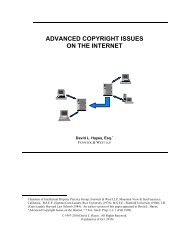Paramount Pictures Corporation v. ReplayTV, Inc., Joint Stipulation ...
Paramount Pictures Corporation v. ReplayTV, Inc., Joint Stipulation ...
Paramount Pictures Corporation v. ReplayTV, Inc., Joint Stipulation ...
You also want an ePaper? Increase the reach of your titles
YUMPU automatically turns print PDFs into web optimized ePapers that Google loves.
12345678910111213141516171819202122232425262728user could conceivably be ordered— and only for the minimum period necessary,not indefinitely.Plaintiffs’ naked assertion that “ the Federal Rules do not explicitly recognize‘privacy’ as a grounds for refusing to provide relevant information” obscures thesimple truth: “ Federal Courts ordinarily recognize a constitutionally-based right ofprivacy that can be raised in response to discovery requests.” Soto v. City ofConcord, 162 F.R.D. 603 (N.D.Cal. 1995); see also Johnson v. Thompson, 971 F.2d1487 (10th Cir. 1992) (upholding magistrate judge’ s decision to deny discovery ofthird party identifying information on privacy grounds). Plaintiffs’ authorities donot support their hostility to privacy rights. 45/6. Plaintiffs Have Shown No Need For Discovery Of The RecordingsMade By Defendants’ Employees In Product Development.Plaintiffs also offer no valid theory to justify intrusion into the recordingbehavior of Defendants’ employees. First, they have not confined their inquiry tomanagement personnel, as at least was done in Napster.Second, unlike Napster, the content recorded on <strong>ReplayTV</strong> 4000 doesnot provide any possible evidence of knowledge of specific infringing (as requiredto satisfy the “ knowledge prong” for contributory infringement). In this regard,In Walt Disney Co. v. DeFabiis, 168 F.R.D. 281, 283 (C.D. Cal. 1996),Disney sought the identities of students in a class taught by defendants, where thedefendants had allegedly told students they were former Disney employees whowere “ licensed by plaintiff to teach courses in ‘Disney cartooning’ and ‘Disneyanimation’ . . . .” In that case, the only way to verify whether such statements weremade to students was to seek testimony from students. The focus in Disney was noton the students’ actions, but their observations of the defendants’ actions. Here, thefocus of the evidence sought is on the third party’ s own private conduct, not merelytheir observations of Defendants’ public actions. A greater privacy interestnecessarily exists in one’ s own private behavior and personal information than inone’ s observations of others.Equally misplaced is Plaintiffs’ reliance on Milwaukee Concrete Studios v.Greely Ornamental Concrete Products, 140 F.R.D. 373 (E.D. Wis. 1991). There,Milwaukee Concrete never asserted privacy as an objection to production, onlyattorney-client and work product privileges. Milwaukee Concrete allegedlysubmitted partial results of a customer survey as exhibits to an unsuccessful motionfor preliminary injunction, and Greely sought production of the entire survey.45/57
















